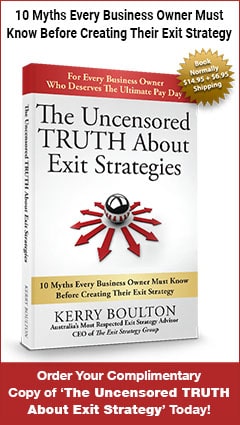Every Family’s Business: Determining The Best Exit Strategy
Even if you’re not a baby boomer, even if you’re younger than that and you’re considering succession, it’s very much more around “not stuffing it up” as a headline said that I saw earlier today.
The transfer of wealth over the next 10 years or so is estimated to be around 3.5 trillion dollars. Trillion dollars. So there’s an awful lot at stake here.
I would like you to consider 12 common sense questions that are around protecting your wealth and exiting your family business successfully. These questions have been developed by Thomas Deans, PhD, who has spent a lot of time working with family businesses and has written a best-selling book on the subject.
If you’re a parent and contemplating the gifting of your operating business to a child or to children, you’ve got to find value in hearing about whether the succeeding generation is prepared to risk their capital today to actually purchase the business.
These questions are really good, definitely worthwhile, and I suggest you need to involve not only yourself but also your successor, whether that’s a child or a key employee in the business. If you have no relatives working in the business, just use the “parent” questions for the business owner and the “child” questions for the key employee.
There are no right or wrong answers to any of these questions — the only purpose is to create greater clarity between the generations and how and when the business will be sold or moved on.
Question #1: What does our business look like in five years?
This question is for both the parent and the child.
What does the parent think the business is going to look like in five years? And what’s the view of the child?
You need to have a pretty rigorous discussion around this, just to see whether you share the same views. Will you be providing the same sorts of services and products? What’s the growth of the business going to look like? How will the business actually grow over that period of time? What will the growth depend on? Are there contracts that need to be maintained? Are there staff that need to be maintained?
As the successor or key employee or child, what do you think? Do you have the same opinions as the parent? As the business owner?
Question #2: Are you interested in selling your shares?
So whoever has shares in the business, are you interested in selling those? And if you are, to whom?
Sometimes businesses have shareholders who are not in the business. Sometimes you might be a shareholder who has control, but you don’t want to sell down all your shares — you may wish to only partially sell those shares.
Consider what the structure is of your business. Are you worried that this is for both parent and child? Or that it’s for business owner and successor to answer? Are you sure of the structure? Are you considering what debt might be involved if you were to purchase the shares? Would you like to give some other employee or family member a start and perhaps provide the opportunity to get involved in the business?
Question #3: Are you interested in buying shares and acquiring control?
This question is for the successor or the child.
I’ve seen several businesses where the assumption has been made that the successor would want to be the successor. Sounds strange, doesn’t it? But it really means whether or not you want to buy the stock and take control.
Especially in a family business, it could be that the person who is having that discussion is not the one who really wants to take over the business. It’s very important to take on board these questions with every key person or relative who’s involved in the business and has an interest in being a successor down the track.
Next blog, we’ll tackle questions 4-6!



Recent Comments